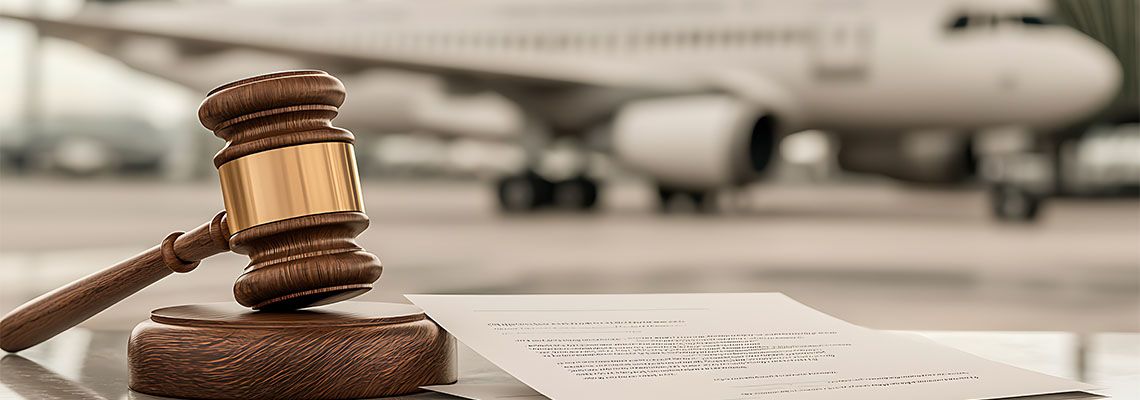Acquiring an aircraft for your business is a monumental step that can revolutionize your operations, improve efficiency, and even offer an edge in a competitive market. However, deciding whether to purchase or lease a plane is no small task.

A.R.R.O.W. Aviation Documentation Checklist
In aviation law, guaranteeing compliance with regulatory requirements is crucial for the operation of aircraft in Texas. One of the key frameworks for verifying this compliance is the A.R.R.O.W. documentation checklist.
A.R.R.O.W. is an acronym representing the essential documents that must be maintained to comply with Federal Aviation Administration (FAA) regulations. This comprehensive guide from an aviation lawyer discusses the A.R.R.O.W. checklist, explaining each component and its relevance within the context of Texas aviation law.
What Is A.R.R.O.W.?
The A.R.R.O.W. checklist is a mnemonic device used to remember the essential documents required for the operation of an aircraft. Each letter in A.R.R.O.W. stands for a specific type of documentation that must be present and up-to-date for legal and operational purposes. The A.R.R.O.W. acronym stands for:
Airworthiness Certificate
Registration
Radio Station License
Operating Limitations
Weight and Balance
As your aviation lawyer will tell you, each of these documents plays a vital role in making sure that an aircraft is compliant with FAA regulations and is safe for operation.
Airworthiness Certificate
An Airworthiness Certificate is a document issued by the FAA that certifies an aircraft is in a condition for safe operation. It confirms that the aircraft complies with all the safety standards required for its type and has been inspected and deemed airworthy by a qualified mechanic or inspector.
Types of Airworthiness Certificates
In the United States, including Texas, there are two primary types of Airworthiness Certificates:
Standard Airworthiness Certificate: This is issued for aircraft that meet all the FAA requirements for type certification. It's applicable to aircraft used for general aviation, commercial operations, and other specified uses.
Special Airworthiness Certificate: This is issued for aircraft that don't meet the requirements for a Standard Airworthiness Certificate. It includes experimental aircraft, restricted category aircraft, and other categories.
Renewal and Maintenance
Airworthiness Certificates don't expire, but they must be maintained in accordance with FAA regulations. Aircraft owners are required to make sure that their aircraft undergo regular maintenance and inspections to remain in compliance. The certificate must be renewed if the aircraft undergoes significant alterations or repairs that affect its airworthiness.
Texas-Specific Considerations
In Texas, aircraft owners must make sure that their Airworthiness Certificate is readily available and up-to-date when operating within the state. Inspections and maintenance must be conducted by FAA-certified mechanics or repair stations.
Registration
Aircraft registration is the process of officially recording an aircraft with the FAA. The registration certificate identifies the aircraft and its owner, providing legal recognition of the aircraft's ownership and allowing it to be operated within the United States.
Registration Process
To register an aircraft, the owner must submit a completed Aircraft Registration Application (Form 8050-1) along with proof of ownership and payment of the registration fee. The FAA will issue a Certificate of Aircraft Registration upon approval.
Renewal and Changes
Aircraft registration is valid for three years. Owners must renew their registration before it expires to avoid penalties or possible loss of registration. Additionally, any changes in ownership, address, or aircraft status must be reported to the FAA to update the registration.
Texas Specific Considerations
Texas state law requires aircraft owners to maintain accurate records and make sure that their registration information is current with the FAA. Additionally, while Texas doesn't impose state-specific registration requirements beyond federal regulations, local laws and ordinances may affect aircraft operations, so it's essential to stay informed of any local regulations.
Radio Station License
As your aviation lawyer will tell you, a Radio Station License is required for aircraft equipped with radio communication equipment. This license authorizes the operation of radio equipment and guarantees compliance with Federal Communications Commission (FCC) regulations. It's distinct from the aircraft’s registration and airworthiness certification.
Licensing Process
To obtain a Radio Station License, the aircraft owner must submit an application to the FCC, including details about the aircraft’s radio equipment and its intended use. The license must be renewed periodically, typically every ten years, although specific renewal periods can vary.
Renewal and Maintenance
Maintaining the Radio Station License involves keeping the license up-to-date with the FCC and verifying that all radio equipment is functioning properly and in compliance with federal regulations. Changes in equipment or operation must be reported to the FCC.
Texas Specific Considerations
In Texas, aircraft operators must make sure their Radio Station License is current and comply with both FAA and FCC regulations. Texas doesn't have additional state-specific requirements for radio licensing beyond federal mandates.
Operating Limitations
Operating Limitations are documents that outline the specific operational parameters for an aircraft. These limitations are included in the Pilot’s Operating Handbook (POH) or Aircraft Flight Manual (AFM) and provide critical information on safe operation, performance, and restrictions.
Contents of Operating Limitations
Operating Limitations typically include:
Aircraft performance data: Information on the aircraft’s speed, altitude, and other performance parameters.
Weight and balance information: Guidelines on how to calculate and manage the aircraft’s weight and balance.
Equipment requirements: Specifications on required and optional equipment.
Operational restrictions: Limits on aircraft use, such as prohibited maneuvers or operational environments.
Updating and Compliance
Aircraft operators must make sure that they're familiar with and adhere to the operating limitations specified in the POH or AFM. Any modifications or changes to the aircraft that affect its operating limitations must be documented and updated in the manual.
Texas-Specific Considerations
In Texas, operators must adhere to the FAA’s operating limitations and make sure that these documents are readily available during flight operations. Texas doesn't impose additional state-specific requirements for operating limitations beyond federal regulations.
Weight and Balance
Weight and Balance documentation provides critical information on the aircraft’s loading and weight distribution. Confirming proper weight and balance is essential for safe aircraft operation, as improper loading can affect flight performance and safety.
Weight and Balance Calculations
Weight and Balance calculations involve:
Determining the Aircraft’s Empty Weight: The weight of the aircraft without any passengers, cargo, or fuel.
Calculating Load Limits: Verifying that the total weight of passengers, cargo, and fuel doesn't exceed the aircraft’s maximum allowable weight.
Balancing the Aircraft: Making sure that the center of gravity is within the specified limits to maintain proper control and stability during flight.
Maintenance and Updates
Weight and Balance records must be updated whenever there's a change in the aircraft’s configuration, such as adding or removing equipment, or changes in the aircraft’s load. Accurate and current weight and balance data must be maintained for every flight.
Texas Specific Considerations
In Texas, aircraft operators must make sure that weight and balance calculations are conducted accurately and updated regularly to comply with federal regulations. Texas doesn't have additional state-specific requirements for weight and balance documentation beyond federal regulations.
Guaranteeing Compliance with A.R.R.O.W. in Texas
Verifying compliance with the A.R.R.O.W. checklist in Texas involves several key practices.
Regular reviews: Aircraft owners and operators should regularly review all A.R.R.O.W. documentation to confirm it's current and complies with FAA regulations. This includes checking the expiration dates of certificates, licenses, and registration.
Record keeping: Maintain detailed records of all A.R.R.O.W. documents and any changes or updates made. Proper record-keeping verifies that documentation is readily available during inspections or legal proceedings.
Professional assistance: Engage with aviation professionals, such as FAA-certified mechanics, aviation lawyers, or flight instructors, to verify that all documentation and compliance requirements are met. Professional guidance from an aviation lawyer can help handle challenging regulatory requirements and maintain compliance.
Staying informed: Stay informed about changes in federal and state regulations that may impact A.R.R.O.W. documentation. Regularly check for updates from the FAA and other relevant agencies to confirm ongoing compliance.
Contact an Aviation Lawyer Today
The A.R.R.O.W. checklist is a vital component of aviation law in Texas, making sure that aircraft operations comply with FAA regulations and are conducted safely.
By maintaining up-to-date documentation for Airworthiness Certificates, Registration, Radio Station Licenses, Operating Limitations, and Weight and Balance, aircraft owners and operators can avoid legal issues and make sure of the safety and legality of their operations. Understanding and adhering to these requirements is crucial for successful and compliant aviation operations in Texas.
If you need an experienced aviation litigation lawyer in Houston, Texas, or the surrounding areas of Dallas, San Antonio, or Austin, contact William G. Harger & Associates, PLLC today. As a former professional pilot and mechanic, Bill has extensive experience helping aviation professionals just like you.
RECENT POSTS
Corporate aircraft are valuable assets that require meticulous care to operate safely, effectively, and in compliance with regulations. For aircraft owners, operators, and aviation businesses, it's not just about ensuring the aircraft remains airworthy but also about protecting the significant investments tied to these machines.
The aviation industry is a dynamic and complex sector, where businesses often collaborate to share resources, reduce costs, and expand their reach. One of the most effective ways to achieve these goals is through a joint venture. Whether it’s a partnership between airlines to streamline operations or a collaboration between manufacturers to develop cutting-edge aircraft technology, joint ventures play a pivotal role in shaping the industry.



